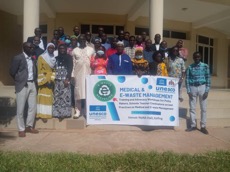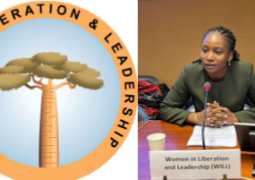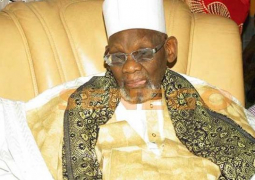
The workshop, held at the National Nutrition Agency (NaNA), brought together policymakers, environmental educators, and stakeholders to discuss best practices for waste management. The initiative, supported by UNESCO funding, aims to raise awareness and promote sustainable solutions across schools and communities in two targeted regions.
The training is part of a broader project implemented by NATCOM in collaboration with the National Federation of the Gambia Clubs for UNESCO and ASP Net through UNESCO’s Participation Programme. The project focuses on increasing awareness and encouraging policy actions aligned with national strategies on medical and e-waste management.
Speaking at the event, UNESCO Senior Program Officer Lamin Jarjou, representing the secretary general of the Gambia National Commission for UNESCO/ICESCO, emphasised the urgent need for policy-driven solutions. “With rapid technological advancements, the volume of electronic and medical waste has surged, making e-waste one of the fastest-growing solid waste streams globally,” he stated.
According to global reports, at least 62 million tons of solid wastes are generated annually, with a significant portion of medical and e-waste disposal remaining undocumented.
He warned against the dangers of informal dumping and open burning, which release hazardous chemicals into the environment. “As a signatory to the Basel Convention, The Gambia must take waste management seriously,” he added.
Representing the Ministry of Environment, Climate Change, and Natural Resources, Principal Assistant Secretary Momodou Kanyi, outlined the composition of medical waste, explaining that while most healthcare waste is non-hazardous, a critical portion—10-25%—poses serious health and environmental risks. “Poor management of hazardous medical waste exposes healthcare workers, waste handlers, and communities to infections, toxic effects, and injuries,” he warned.
Ousman Bah, deputy permanent secretary at the Ministry of Basic and Secondary Education, emphasised the workshop’s significance particularly for educators. “This training integrates health, environment, and technology—three crucial aspects of 21st-century education. Teachers must equip students with knowledge on safe disposal practices to protect themselves and their communities,” he noted.
Lamin Ceesay, secretary general of the National Federation of the Gambia Clubs for UNESCO (NAFGUC), urged participants to take the training seriously. “Every day, people inhale hazardous chemicals unknowingly. We must raise awareness and ensure this information reaches the broader community,” he stressed, expressing gratitude to UNESCO for funding the initiative.





